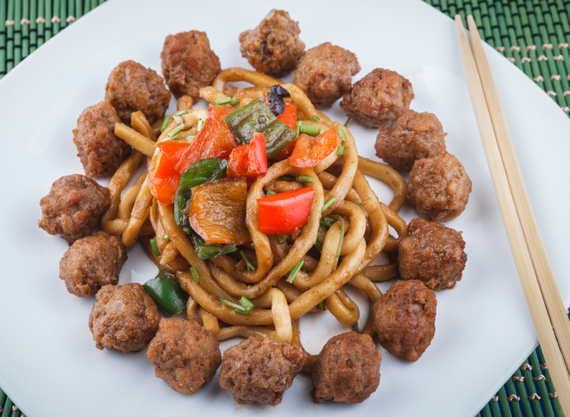Do you have trouble leaving that last bite of food when you are finished? Most of us do.
Welcome to the next chapter of my sneaky food experiments. The latest experiment takes place in Beijing, China while celebrating a friend's 40th birthday. If you read my previous article about my trip to France last summer, you know that I like to conduct food sneaky experiments. Are they scientific? Not really. Are they fun and revealing? Yes. These friends are the perfect group to experiment on, particularly while traveling. They are totally out of their element and therefore have a harder time seeing the sneaky experiment coming. This trip consisted of two physicians, three professionals in health care, one executive sales manager, a software manager in California and an artist. Just like the rest of us, they always seem to fall for the mindless eating environment. It's no surprise. Even being well educated about nutrition and attentive to your health can only do so much to counteract our ingrained mindless eating culture.
In China, almost all of our meals were served via what we call a "Lazy Susan" (P.S. I object to this name for all the other Susan's out there). The Lazy Susan is a common way of serving a meal in China. It's a convenient and easy way to pass food with minimal disruption to your dining companions.
One of the first statements that perked my interest was about a plate of meatballs. On a serving plate in the middle of the Lazy Susan, there was just one meatball left. A woman in our group said, "Okay, who is going to eat the last meatball. We can't leave one man standing." This was less of a question and more of a directive. It struck me that whether you are in China or at your kitchen table, it is often difficult to leave food standing. Bingo. The perfect experiment.
We were served meatball-style dishes at several meals along with many other dishes. So, I orchestrated that just one be left behind whenever we had them. What happened? Out of five meals, each and every time someone insisted on taking the last meatball with comments like, "I'll take the last one," or "Can't leave just one," "I'll finish it up." Interestingly, this pattern did not hold true for other dishes. The group was able to leave behind the extra with the exception of a dish of homemade dumplings. The comment was, "Is it rude not to eat them all?"
So, the experiment begs the question: What creates so much internal pressure that it is uncomfortable to leave food behind? For some of us, it's the concept of waste. Several friends gave examples of parents who applied guilt by reminding them that there were hungry children in the world. It's hard not to feel bad when viewed in this context. For others, it might be a black or white issue. The plate is empty or full, one left is too grey. Or, it may just be habit. Many of us routinely eat the entire plate just because it is there.
Take a moment and think about why it might be difficult for you to leave the last bite. Here are four tips for being able to "let go" and leave the last meatball or whatever is on your plate.
1) Be Mindful of Habit vs. Hunger. Are you eating the last bite out of habit because you are used to finishing your entire plate? Research out of Cornell University indicates we will eat 92 percent of anything we serve ourselves. Thus, if it's on your plate, you are likely to eat it. So, one of the best moments to be mindful is when you are putting the food on your plate.
2) Mindfully Practice. Intentionally leave some food behind, even if it is a bite or two. The more we practice the easier it becomes. Why is it important? Avoiding overeating hinges on listening to your internal cues (feeling satisfied) rather than stopping eating based on external cues (meals are done or plate is empty). Start with leaving one bite. Then two at the next meal and so forth.
3) Deal With Guilt. Be honest with yourself. Are you eating the last bites to avoid guilt? If so, think about what prompts this guilt. If you don't like throwing food away, use it to feed the birds or start a compost pile. A better approach is to be mindful of what you buy at the store, how much you order at a restaurant and the amount you cook. Try to food "downsize" so waste is no longer an issue.
4) Remind Yourself It's Okay. It sounds simple. But, it's a shift in thinking for many. Reframe the thought of "not finishing the plate" which can trigger the feeling of failure (to not finish something) to successfully eating mindfully when a few bites are left behind/you don't finish up the leftovers.
Stay tuned for more of my sneaky food experiments!
Take Dr. Albers' FREE QUIZ The First Step To Mindful Eating Is To Determine Your Eat.Q. Score - It Only Takes 2 Minutes www.eatq.com
Dr. Albers is a psychologist at the Cleveland Clinic and author of the book, EatQ, Eating Mindfully and 50 Ways to Soothe Yourself Without Food. She graduated from the University of Denver & completed a post-doctoral fellowship at Stanford University. Dr. Albers is frequently quoted in Shape, Fitness, NPR, Wall Street Journal and Prevention magazine. www.facebook.com/eatdrinkmindful.
